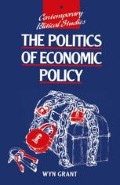Abstract
In 1991 a businessman from Cardiff attempted to sue the British Government because he claimed that his business had been ruined by their mismanagement of the economy. His attempt eventually failed, but the fact that it was made at all, and was not immediately dismissed by the courts, reflects a widespread perception that the government is responsible for the condition of the economy. This perception has persisted despite attempts by government to reduce the level of direct intervention in the economy in the 1980s, although this withdrawal had the consequence of increasing government’s role as a regulator of the privatised public utilities. In practice, much of what happens in the economy is influenced by the individual decisions of investors and consumers, and by international economic developments which are beyond the control of any national government. Much of government economic policy is a reaction to events, rather than an attempt to anticipate them. Whether governments are re-elected does, however, depend to a considerable extent on the perceptions of electors about the extent to which the politicians in office have helped or hindered their personal economic well being.
Preview
Unable to display preview. Download preview PDF.
Copyright information
© 1993 Wyn Grant
About this chapter
Cite this chapter
Grant, W. (1993). Introduction. In: The Politics of Economic Policy. Contemporary Political Studies. Palgrave, London. https://doi.org/10.1007/978-1-349-14903-2_1
Download citation
DOI: https://doi.org/10.1007/978-1-349-14903-2_1
Publisher Name: Palgrave, London
Print ISBN: 978-0-333-73912-9
Online ISBN: 978-1-349-14903-2
eBook Packages: Palgrave Economics & Finance CollectionEconomics and Finance (R0)

